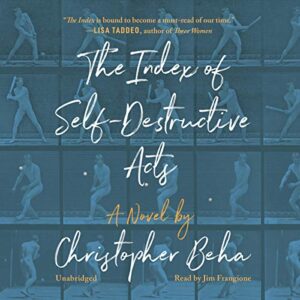What is a literary life? What makes a written work a literary landmark—or something lasting in any way at all? I once thought I knew the answers to these things, but now am not so sure. For that matter, I’m not even sure I know what literature itself is anymore.
I’m thinking about that question because I just finished reading Vince Passaro’s second novel, Crazy Sorrow. The book came out in mid-September, but it had been on my list from months before—Passaro is one of the writers I’ve followed for years, and thought should get a lot more positive attention than he has done.
I’d read, and loved, his much-heralded 2002 novel Violence, Nudity, and Adult Content, which was a sort of odd hybrid of a sexy thriller mashed up with the narrative of a troubled marriage.
Part of the reason the book was much-heralded by the time it came out, though, was that Passaro was a prolific contributor to print magazines during the nineties. It’s probably worth noting, for educational purposes, and for my children, who are twelve and seventeen—that the Internet was not a primary literary destination from, say, 1995-2000, and could still be referenced, without irony, as the “World Wide Web.” The time period saw the launch of both Oprah and Real Simple magazines, and a mark of Passaro’s catholicity as a writer—more about that later—is that he saw no comedown in producing a raft of 300-word book reviews and short commentaries in these magazines mostly read by women. (Which, I aver, was probably a great training in flexibility and tone.)
But he also logged a hefty record of major publications in the historic magazines of record—including the standout “Who’ll Stop the Drain? Reflections on the Art of Going Broke,” published in Harper’s in 1998.
In a wry confessional tone, Passaro meticulously details his and his wife’s attempts to have a middle-class family life while living on $100,000 in New York City.
This is not a story about conspicuous consumption. My wife and I didn’t, with one exception, travel; we didn’t buy a house or an apartment or expensive furniture we could not afford. Indeed, she will be quick to point out, we didn’t buy any home or any furniture, and still live in our same rent-stabilized apartment with three children and such items as we’ve been able to pick up along the way, such as a secondhand couch and almost 4,000 books…
And now we are $63,000 in debt.
I think…
The great engines of this essay—which I still look up and reread a couple of times a year—are Passaro’s passion for his family’s flourishing, and his passionate, meticulous understanding of the relentless ways of finance and how they serve to undermine humanity. Part of the family’s life in financial extremis has to do with trying to raise a family in Manhattan on a single, middle class salary. (I read it first not long before starting my own family, and I’ve returned to it as a touchstone and a warning every time I’ve had to put private school activity fees onto a credit card.)
Passaro’s latest novel, Crazy Sorrow, a full twenty years in appearing, focuses less on ordinary family flourishing. As the dust jacket summarizes efficiently, the plot revolves around the chance meeting of Columbia students “George” and “Anna” amid New York City’s Bicentennial celebrations on July 4, 1976. Then, after their initial romance goes awry, the story spirals into what happens to each of them in the decades since, along with flashbacks and reconsiderations of their own grief-filled histories.
What happens in the decades since, to each of them—as The New York Times jokes a little about in its review—is a lot of sex. The Times review judges the extensive sex scenes as mostly “boring,” and avers that the real engine of the book is George’s career, because the small coffee roasting business he ends up launching with a friend ends up being something very much like Starbucks, and the explosion of George’s business as the twentieth century winds down is a metonymy for rapacious capitalism.
Anna, meanwhile, becomes a successful attorney. Neither George nor Anna is especially happy. Some sad things await them both. (A good look at the cover will give you some idea about what at least one of those things is, although I confess I didn’t think about that myself.)
There’s a lot of meandering narrative that makes me wonder whether this book, which comes up to some 450 pages, represents the refraction of a much longer narrative, as billowing and disparate as the decades the book’s trying to distill. And whether an agent, or an editor, encouraged the shaping of a veritable Infinity into this particular package.
But this book encompasses far more than the tidy summary above. The book’s many and immense pleasures lie in its narrative beauty, and verisimilitude—particularly its evocation of place, of New York.
Come to think of it, it is New York that’s the actual central character, the actual love object of the novel. The passionate engine driving this book forward is the author’s brief against the city’s gradual decline—from seventies grit and license to its dominance by chain stores and billionaires in the two-thousands.
Those changes are reflected in almost photorealist prose—winter sidewalks, bridges and tunnels, the details of the July, 1977 blackout. (It’s worth comparing this narrative of the blackout against the one in Garth Risk Hallberg’s also-heady New York novel, City on Fire.) Passaro’s New York feels so real, and to be of a certain age is to say, I knew the world when it was this way. (And to remember the world when it was this way is to also be implicated in its decline, but that’s another story.)
So perhaps the form of Crazy Sorrow is off—it’s certainly not the “Roman arch” of novel construction that Flannery O’Connor cited Caroline Gordon as advocating. But still, you must read this book—sex and all!
We live in an era of endless digital text, and one must sort through the river of the text that comes toward us. My husband is an audio engineer, and spends a fair amount of time isolating fragments of audio and distilling them from sound imperfections, to lift them into clarity. Audio editing programs enable you to take a cursor, go into the stream of audio, then snip exactly the part you want to prune, the part you want to remain.
I guess what I am saying is that perhaps this a good way to read this novel, and I advocate dipping into it. Do not be put off by its shape, its tracking of life over an immensity of years. There are enormous joys here, just waiting to be sifted, selected—and lifted into light.
Caroline Langston was a regular contributor to Image’s Good Letters blog, and is writing a memoir about the U.S. cultural divide. She has contributed to Sojourners’ God’s Politics blog, and aired several commentaries on NPR’s All Things Considered, in addition to writing book reviews for Image, Books and Culture, and other outlets. She is a native of Yazoo City, Mississippi, and a convert to the Eastern Orthodox Church. She lives outside Washington, D.C., with her husband and two children.





